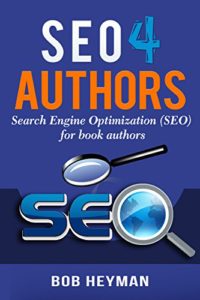
Search engine optimization (SEO) gives you fantastic opportunities to market and promote your book. Each chapter is a separate webpage, and each webpage is an opportunity to promote your book not only to those people who have overall interest in the topic but also to those people who have a specific interest in the topic of an individual chapter.
Chapters
A chapter is a webpage. If your book has 23 chapters, that gives you 23 different opportunities to bring people on the internet into your book. If they reach your book because they’re interested in one chapter, they may also be interested in other chapters. As a consequence, each chapter is an SEO opportunity you can’t take lightly.
To maximize SEO, you’ll want to:
- Write good titles and headings
- Organize your writing with good copywriting techniques
- Place appropriate keywords and key phrases into your text in place of other words you might use
- Add keywords to the proper places in the webpage HTML structure
- Use other SEO techniques
It’s beyond the scope of this book to provide a comprehensive SEO lesson. Certainly many books have been written on the topic, and you need to review a few and pick one to read for your own enlightenment. But the bottom line here is to develop the greatest readership possible, and your 23 chapters give you 23 opportunities to do so.
Revisions
In the chapter on revisions, I discussed revising your webpages as new changes and ideas in the content materialized. This works well for many reasons not the least of which is the fact that the search engines love change. I’ve also suggested that experimenting with the marketing and advertising embedded in your chapter webpages (see Chapter 26 Affiliate Advertising) is not only potentially lucrative but also a way to bring changes for the purposes of more effective SEO.
You need to fine-tune your SEO efforts in your chapters too (e.g., change keywords). Not only does it enable you to experiment and refine your SEO but it also improves your SEO just by the fact that you have changed something.
Limited Access
Keep in mind if your book has limited access (if the search engine robots cannot gain access to your webpages), your SEO opportunities may be curtailed. In order to get the maximum SEO out of your webbook, it has to be open to everyone, not just those who paid pay for access.
For that reason, if you sell your webbook by only allowing people to read it if they have paid for a password, your SEO opportunities may be limited. You may not get the benefit of the 23 webpages of SEO.
Accordingly, if you have a book you want to make accessible to the public yet need to get paid, you need to figure out a way to generate revenue without selling the book. Perhaps the most straightforward way, as I’ve suggested elsewhere in this book, is affiliate advertising.
But wait The situation may not be as dire as I’ve suggested. There may be SEO techniques or web membership software that will expose your webbook to the search engines without admitting users who have not paid to read your webbook. SEO is a fast changing field, which requires ongoing research to keep up to date.
Summary
If you promote your ebook or printed book on the web, you will likely have just a catalog description to do so. The description shows up in online bookstore catalogs, such as Amazon. Even a website dedicated to promoting your ebook or printed book will typically have only several webpages, usually full of promotional copy. Such promotion may be of very little interest to many of your potential readers.
In contrast, your webbook is a website that gives you 23 opportunities (assuming 23 chapters) to market to a general audience and also to specifically targeted audiences. Therein lies the grand opportunity to give your webbook its widest possible readership. Think not of SEO as a routine chore or something you have to do because everyone acknowledges its value. Rather think of it as an ongoing opportunity to boost readership. It’s a necessary solution for effective webbook marketing.